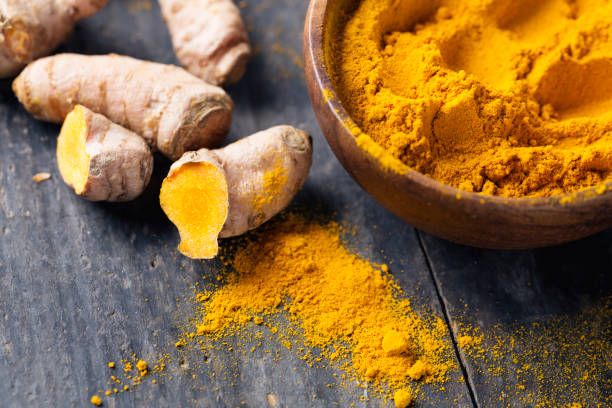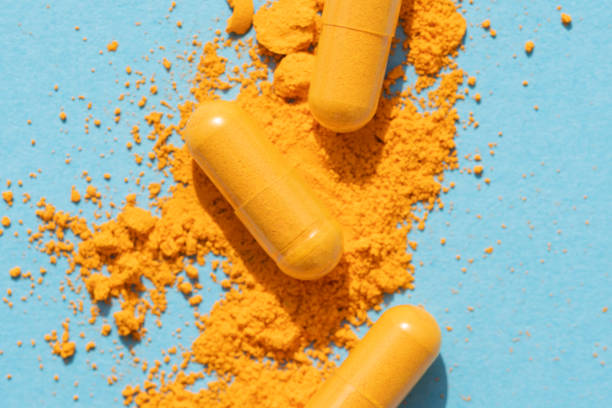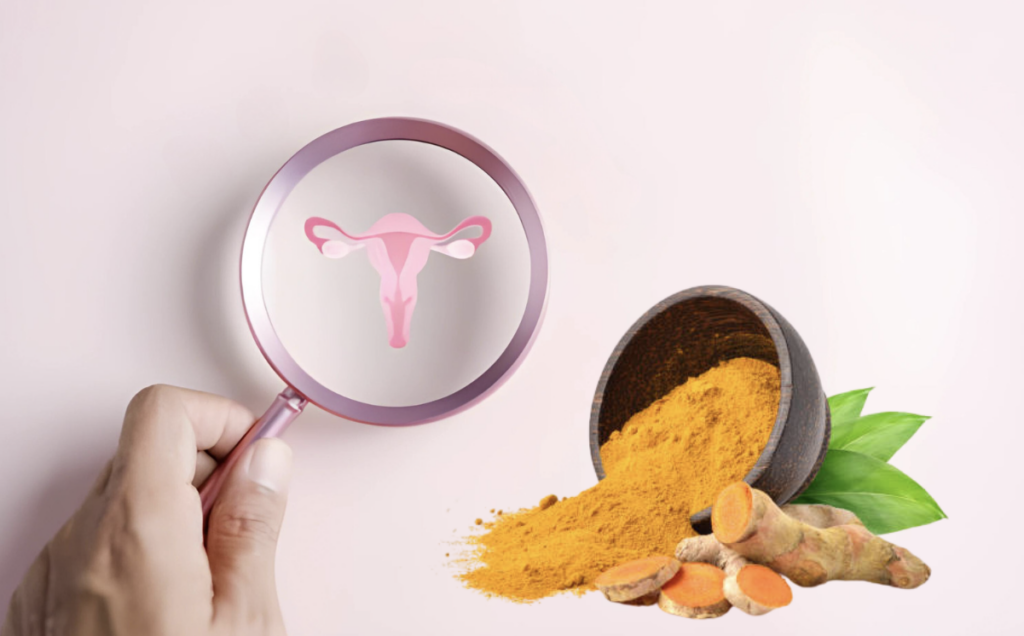Reproductive Health, Supplements and Herbs
How Turmeric Boosts Your Female Reproductive System
Turmeric, a vivid golden spice known for its culinary and medicinal characteristics, has recently received more attention for its possible benefits to female reproductive health. Beyond its culinary applications, turmeric includes curcumin, a bioactive molecule with potent anti-inflammatory and antioxidant properties. While turmeric has long been valued in traditional medicine for its wide range of therapeutic benefits, contemporary science is beginning to recognize its specific effects on the female reproductive system.
In this enlightening article, we look at turmeric and its varied advantages for the female reproductive system, including its ability to relieve menstruation discomfort, balance hormone levels, support fertility, and treat reproductive diseases. Join us as we explore the therapeutic potential of turmeric for women’s reproductive health and well-being, from centuries-old cures to cutting-edge scientific discoveries.

Turmeric and Female Reproductive Health
Turmeric’s numerous health advantages have made it a staple of traditional medicine for generations. Recent research suggests that turmeric may benefit female reproductive health. This section of the article will look at the potential benefits of turmeric for menstrual health, polycystic ovarian syndrome (PCOS), fertility, and pregnancy.
Impact on Menstrual Health
Turmeric has been shown to have anti-inflammatory and antioxidant qualities, which may aid with menstruation pain and discomfort. Curcuminoids, the main components in turmeric, have been found to lower inflammation and oxidative stress, two prominent causes of menstruation pain. In addition, turmeric may help regulate menstrual periods and minimize heavy bleeding.
Influence on Polycystic Ovary Syndrome (PCOS)
Polycystic ovarian syndrome (PCOS) is a hormonal condition that affects a large proportion of reproductive-age women. Women with PCOS frequently experience irregular menstrual cycles, elevated androgen levels (male hormones), and ovarian cysts. Turmeric has been shown to have anti-inflammatory and antioxidant effects, which may help reduce inflammation and oxidative stress in women with PCOS. Additionally, turmeric may help regulate menstrual periods and alleviate PCOS symptoms.
Effects on Fertility and Pregnancy
Turmeric may have beneficial effects on fertility and pregnancy. It has been found in studies to help men enhance sperm quality and motility, perhaps increasing their chances of becoming pregnant. Turmeric may also lessen the risk of pregnancy problems like preeclampsia, gestational diabetes, and preterm delivery. However, further research is required to properly understand turmeric’s impact on fertility and pregnancy.
Finally, turmeric may offer numerous benefits for female reproductive health. Its anti-inflammatory and antioxidant characteristics may aid in reducing menstruation pain and regulate menstrual cycles. Turmeric may also help lower PCOS symptoms while improving fertility and pregnancy outcomes. However, before using turmeric to treat any health concern, contact a healthcare expert.

Curcumin’s Role in Cancer Prevention in Women
Curcumin, a polyphenol derived from the turmeric plant, has been demonstrated to have anticancer effects. Chronic inflammation is linked to the development of cancer, and curcumin’s anti-inflammatory properties may help prevent it. Furthermore, curcumin has been proven to suppress carcinogenesis, angiogenesis, and tumor formation.
Breast Cancer
Breast cancer is the most frequent cancer among women globally. Curcumin has been demonstrated to decrease the development of breast cancer cells and cause cell death. It has also been demonstrated to sensitize breast cancer cells to chemotherapy and radiotherapy, potentially increasing the efficiency of these treatments.
Ovarian Cancer
Ovarian cancer is the sixth most frequent cancer in women, and it has a significant fatality rate. Curcumin has been demonstrated to suppress the growth of ovarian cancer cells and cause cell death. It has also been demonstrated to sensitize ovarian cancer cells to chemotherapy, increasing the efficacy of such therapies.
Endometrial Cells
Endometrial cancer is the most prevalent gynecologic cancer in the United States. Curcumin has been demonstrated to suppress the growth of endometrial cancer cells and cause cell death. It has also been demonstrated to sensitize endometrial cancer cells to chemotherapy, increasing the efficacy of these treatments.
In conclusion, curcumin has been demonstrated to have anti-cancer effects and may aid in the prevention of cancer. It has been proven to impede the proliferation of breast, ovarian, and endometrial cancer cells, making them more susceptible to chemotherapy and radiotherapy. However, further research is required to completely understand the processes by which curcumin exerts its anti-cancer properties, as well as to find the best dose and duration of treatment.

Safety and Side Effects
Recommended Dosage
The recommended daily dose of turmeric for general health is 500-2,000 mg. However, there is no precise recommended dosage for using turmeric to treat female reproductive issues. It is always advisable to consult with a healthcare physician before beginning any new supplement regimen.
Potential Risks
Turmeric is usually regarded as safe for most people when taken in appropriate doses. Some people may develop side effects such as stomach pain, nausea, dizziness, or diarrhea. Additionally, large quantities of turmeric may cause liver damage, thus it is critical to adhere to suggested levels.
Interactions with Medications
Turmeric may interact with some drugs, such as blood thinners and antihypertensives. If you are already taking any drugs, you should contact your healthcare professional before using turmeric.
Turmeric is generally regarded as safe for most people when used in appropriate doses. However, it is critical to be aware of potential hazards and check with a healthcare physician before beginning any new supplement regimen, particularly if you are taking high blood pressure or blood thinners.
Conclusion
Finally, turmeric and its numerous advantages to the female reproductive system highlight its potential as a helpful ally in promoting women’s health and well-being. Turmeric provides a holistic approach to maintaining female reproductive health, from reducing menstruation discomfort to regulating hormone levels and supporting fertility.
While more research is needed to completely understand the processes underlying turmeric’s effects on the female reproductive system, its long history of usage in traditional medicine systems, along with new scientific findings, provide strong reasons to investigate its therapeutic potential. Women can improve their reproductive health and vitality by integrating turmeric into their diets and wellness regimens.
Turmeric has anti-inflammatory, antioxidant, and hormone-balancing effects. As with any supplement, it is critical to speak with a healthcare practitioner before introducing turmeric into one’s regimen, especially for people who have underlying health concerns or are taking drugs. Turmeric, with informed advice and thoughtful integration, can serve as a natural and empowering tool for supporting female reproductive health at all phases of life.
Trusted Health, Wellness, and Medical advice for your well-being


